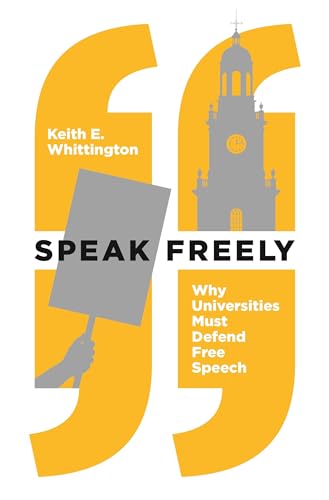Speak Freely
Why Universities Must Defend Free Speech (New Forum Books)
Keith E. Whittington
BOOK REVIEW

Speak Freely: Why Universities Must Defend Free Speech dives headlong into a maelstrom of ideas and ideals that resonate with an urgency pulsating through the very fabric of our society today. Keith E. Whittington, in his cogent exploration of free speech and its vital importance on college campuses, deftly illustrates why the protection of this fundamental right is not merely a privilege but a necessity for the intellectual and societal progress of our institutions.
Whittington challenges the prevailing tides of 'cancel culture' that have surged across university grounds, where dissenting voices seem to be stifled rather than celebrated. The author confronts the reader with a hard-hitting truth: to maintain a vibrant academic environment, universities must champion free speech vigorously, even when the ideas being expressed provoke discomfort or outrage. He argues with the fervor of a passionate advocate that universities, as bastions of knowledge and discourse, must become sanctuaries where ideas can clash, evolve, and flourish. After all, isn't the essence of higher education rooted in challenging the status quo?
Throughout the pages of Speak Freely, Whittington offers a visceral critique of a culture increasingly permeated by the fear of offending. He articulates the danger of an academic landscape where conformity reigns, leaving no room for the robust debate that has historically fueled progress. Here, he draws upon historical examples, illuminating instances where free speech was quenched, leading to dire consequences not only for the academic community but for society as a whole. Each example serves as a chilling reminder of the tumult that follows when free expression is compromised.
What's more, the emotional appeal of Whittington's prose does not merely dwell on the theoretical; it beckons you to reflect on your own experiences as a student, an educator, or even a curious participant in discourse. Ask yourself: have you ever hesitated to speak your mind for fear of backlash? The book meticulously dissects not only the institutional policies that contribute to this chilling effect but also the internalized anxieties that individuals grapple with. This dual focus elicits a compelling sense of urgency-an obligation to reclaim the right to speak freely.
Reader responses to Speak Freely reveal an intriguing dichotomy. Many laud Whittington's insights as a much-needed clarion call for universities to recommit to their foundational principles. They appreciate how he navigates the complexities of a volatile social landscape with clarity and bravery, forging a path through the fog of politically charged debates. Critics, however, argue that his take is overly simplistic, suggesting that he underestimates the nuances of modern sociopolitical contexts that complicate free speech on campuses. Some feel that the author's passionate rhetoric veers into idealism, potentially disregarding the very real implications of harmful speech.
The backdrop against which Speak Freely unfolds is undeniably significant. In an era marked by heightened polarization, the conversations around free speech have become fraught with tension. Whittington's work emerges as not just a reaction to current events but as part of an ongoing dialogue that intersects with movements for social justice and equity. This intersection often showcases the delicate dance institutions must perform between safeguarding free expression and fostering an inclusive environment.
Now more than ever, Speak Freely is essential reading for anyone who values the role of free speech in shaping minds and societies. Whittington's persuasive arguments challenge you to question your views, to confront the discomforting yet necessary dialogue surrounding freedom of expression. The stakes could not be higher-freedom of speech isn't merely about letting provocative ideas flourish; it's about preserving a society where innovation, diversity of thought, and ultimately, progress, can thrive.
In the pages of this book lies a call to arms for educators, students, and citizens alike. We must not shy away from the debate; instead, we must dive headfirst into it. Are we ready to embrace the complexity of free expression? To navigate the tumultuous waters of dissenting ideas? It's time to engage passionately with the tenets of free speech, for these are not just words on a page; they are the lifeblood of our institutions and the bedrock of our freedom.
Engage with Speak Freely and let it confront you, challenge you, and inspire you to take a stand-because the defense of free speech is a battle that defines not just the future of universities but the essence of a liberated society. 💥
📖 Speak Freely: Why Universities Must Defend Free Speech (New Forum Books)
✍ by Keith E. Whittington
🧾 232 pages
2019
#speak #freely #universities #must #defend #free #speech #new #forum #books #keith #whittington #KeithEWhittington